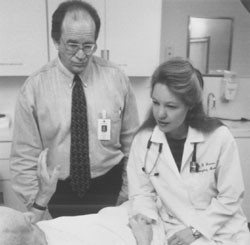
The Vanishing Line 1998
Distributed by First Run/Icarus Films, 32 Court St., 21st Floor, Brooklyn, NY 11201; 800-876-1710
Produced by Maren Monsen
Directed by Maren R. Monsen
VHS, color, 52 min.
Adult
Health Sciences, Death and Dying
Date Entered: 11/09/2018
Reviewed by Lori Widzinski, Health Sciences Library, University at Buffalo, State University of New YorkThe Vanishing Line wrestles with the bioethical question many of us will face - is it better to prolong life for the terminally ill with technological advances or die a natural death? Maren Monsen begins to explore this issue while working as a resident in a San Francisco hospital. Trained to fight disease and keep people alive, Monsen faces a different reality when an emergency room patient continually removes a breathing tube because he wants to die. As she thinks about this patient and how easily he could be kept alive, she begins to question her own attitude toward death and decides to face head-on the issues surrounding the end of life.
Monson contacts friend and hospice social worker, Jim Brigham, and accompanies him on visits to some of his dying patients. Meeting these people who have different ways of accepting their fate, Monsen not only sees life through dying eyes, but also confronts her own personal fears about death. Jim Brigham tells of his own experience dealing with his wife Cay's terminal multiple sclerosis. Brigham poignantly describes the personal conflict for both of them as they decided not to keep her on a ventilator toward the end of her struggle. Jim's spiritual experience in being with Cay until her death showed him that "The act of dying is a sacred thing and a beautiful thing."
Monson uses the powerful imagery of three Greek fates, one that spins the thread of our life, one who measures it and one who cuts the thread. They appear throughout the film, reminding us of the perennialness of life and death. Questions that arise in the course of the program include not only how you would like to be treated in such situations, but also what will it be like to deal with a family member or loved one faced with this decision? How do people go on after someone they love dies? At the end of The Vanishing Line, Monson muses, "I wonder what it'll be like to be doctor who doesn't see death as the enemy?" The use of montage video shots of hospital scenes and actresses playing the three Greek fates set an emotional tone. While the emphasis is on terminally ill hospice patients choosing how they will live their last days, the program gives enough of an unbiased account of Monson's personal quest for answers that viewers will be prompted to weigh both sides of this difficult issue. Winner of the Award for Excellence in Documentary Filmmaking, 1998 Nashville Independent Film Festival. Highly recommended for academic health sciences collections, social work programs and hospice programs.